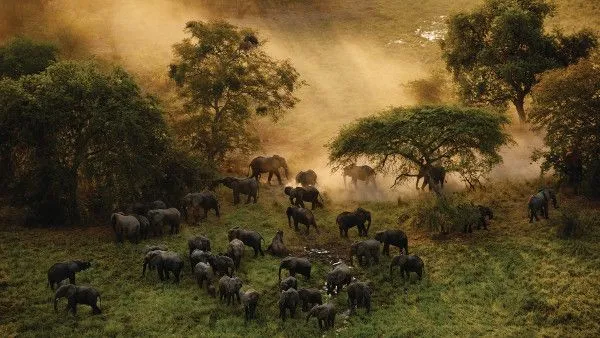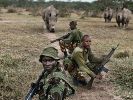Eye For Film >> Movies >> The Last Animals (2017) Film Review
The Last Animals
Reviewed by: Jennie Kermode

There have been five mass extinction events in Earth's history - periods in which, over a relatively short time, 70% or more of all species were wiped out. Many scientists believe that we are in the middle of another, with a similar proportion of species currently experiencing significant decline. As in the past, large animals face a particular risk because habitat loss makes it difficult for them to find enough food to maintain a healthy population size. In the present age, this problem is exacerbated by the risk they face from poachers. Can anything be done to save them?
Kate Brooks is better known for her footage of human conflicts, but here she sets out to look at how some humans are prepared to risk their lives to save animals. Out in the reservations where the last big mammals survive, rangers face potentially deadly attacks by poachers on a frequent basis. Without their work, it would all be over. Without more support for their work, it may be over anyway.

We open with Brooks meeting baby rhinos, demolishing the reputation of the rhino as a fearsome animal once and for all. Bouncy and affectionate, these affable little creatures make unforgettably cute noises. The little bumps that will become their horns just add to their charm - but could, in future, cost them their lives. Going undercover in Far Eastern street markets, Brooks finds rhino horn bracelets trading for thousands of dollars. They're not just coveted for their beauty or rarity - there's still a pervasive myth that they can bring about good health. The scraps of horn not suitable for making into jewellery are ground up and sold as medicine.
There's ivory here too - worth more per gram than cocaine. Some of the items into which it has been carved are undeniably beautiful, but less so when one notices the ochre stains on the unfinished stuff, when one sees footage of the elephants who have paid for it with their lives. We visit a site where a family group has been slaughtered, a youngster no more than five years old in the middle where others were probably trying to shelter it. Flies buzz around the wasted, rotting flesh.
Central to the film is the story of the northern white rhino, one of the most critically endangered animals on Earth. In a Czech zoo, a lonely female greets her handlers with affection. Attempts to breed from her have come to nothing. In laboratories, scientists bank cells - perhaps there will be a day when her species can be restored to life, Jurassic Park-style; that's how desperate things have become.
The Last Animals is a hard-hitting film, often at its most painful to watch when it shows us young animals playing with no awareness of the dangers they face. it is also a testament to the courage of those who go out, day after day, into the bush, often armed with substandard weapons which may be inadequate to protect their own lives, never mind those of their charges. It's a film full of frustration, heavy with the awareness of how unnecessary all this loss is - how it's driven by superstition and by terrorist and rebel groups out to make money so they can buy more weapons with which to kill more humans. Brooks recounts how, when she was exhausted by the human conflicts she had witnessed, it was the very different social behaviour of elephants that helped her to heal.
There's always a danger that films like this will become sentimental and lose touch with the facts, but Brooks balances her documentary well, bringing together a web of intersecting stories and ensuring that what's emotive is also informative. Concern for animals aside, this is a portrait of capitalism at its most destructive, and rhinos and elephants are not the only creatures it will leave you fearful for.
Reviewed on: 03 Nov 2017

















